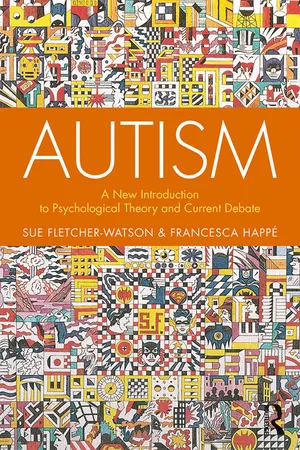
Autism
A New Introduction to Psychological Theory and Current Debate
- 194 pages
- English
- PDF
- Available on iOS & Android
Autism
A New Introduction to Psychological Theory and Current Debate
About this book
Based on Francesca Happé's best-selling textbook, Autism: An Introduction to Psychological Theory, this completely new edition provides a concise overview of contemporary psychological theories about autism. Fletcher-Watson and Happé explore the relationship between theories of autism at psychological (cognitive), biological and behavioural levels, and consider their clinical and educational impact.
The authors summarise what is known about the biology and behavioural features of autism, and provide concise but comprehensive accounts of all influential psychological models including 'Theory of Mind' (ToM) models, early social development models and alternative information processing models such as 'weak central coherence' theory. The book also discusses more recent attempts to understand autism, including the 'Double Empathy Problem' and Bayesian theories. In each case, the authors describe the theory, review the evidence and provide critical analysis of its value and impact. Recognising the multiplicity of theoretical views, and rapidly changing nature of autism research, each chapter considers current debates and major questions that remain for the future.
Importantly, the book includes the voices of autistic people, including parents and practitioners, who were asked to provide commentaries on each chapter, helping to contextualise theory and research evidence with accounts of real-life experience. The book embraces neurodiversity whilst recognising the real needs of autistic people and their families. Thus Autism: A New Introduction to Psychological Theory and Current Debate provides the reader with a critical overview of psychological theory but also embeds this within community perspectives, making it a relevant and progressive contribution to understanding autism, and essential reading for students and practitioners across educational, clinical and social settings.
Frequently asked questions
- Essential is ideal for learners and professionals who enjoy exploring a wide range of subjects. Access the Essential Library with 800,000+ trusted titles and best-sellers across business, personal growth, and the humanities. Includes unlimited reading time and Standard Read Aloud voice.
- Complete: Perfect for advanced learners and researchers needing full, unrestricted access. Unlock 1.4M+ books across hundreds of subjects, including academic and specialized titles. The Complete Plan also includes advanced features like Premium Read Aloud and Research Assistant.
Please note we cannot support devices running on iOS 13 and Android 7 or earlier. Learn more about using the app.
Information
Table of contents
- Cover
- Half Title
- Title
- Copyright
- Contents
- Preface and Acknowledgements
- Chapter 1 Introduction
- Chapter 2 The history of autism
- Chapter 3 Autism at the behavioural level
- Chapter 4 Autism at the biological level
- Chapter 5 Autism at the cognitive level: what makes a good theory?
- Chapter 6 Autism at the cognitive level: primary deficit models
- Chapter 7 Autism at the cognitive level: developmental trajectory models
- Chapter 8 Autism at the cognitive level: domain-general information processing models
- Chapter 9 The impact of cognitive models on autism understanding and practice
- Chapter 10 Looking to the future
- Bibliography
- Index